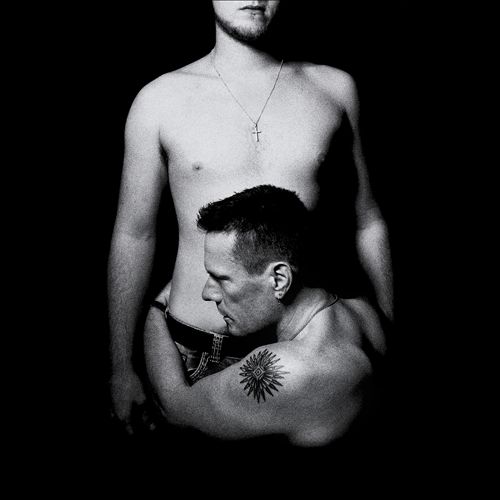
Songs of Innocence (2014)

1. Miracle (for Joey Ramone) 2. Every Breaking Wave 3. California (There is No End to Love) 4. Song For Someone 5. Iris (Hold Me Close) 6. Volcano 7. Raised By Wolves 8. Cedarwood Road (for Guggi) 9. Sleep Like a Baby Tonight 10.This is Where You Can Reach Me Now (for Joe Strummer) 11.The Troubles
The trouble with being U2—arguably the most enduring rock band of their generation—is that even a solid effort can be deemed a disappointment. Such is the curse of a band whose back catalogue includes seismic cultural touchstones and near-flawless artistic reinventions. So when Songs of Innocence arrived in 2014, five years after their last studio album, the criticism had less to do with the content of the music than the manner in which it arrived—via Apple, uninvited, on the devices of hundreds of millions of iTunes users.
What was meant to be a groundbreaking distribution strategy quickly became a cautionary tale. The idea itself—a free U2 album for all—was, in principle, a generous act. The execution, however, felt presumptuous. Listeners awoke to find the album already in their music libraries, whether they’d asked for it or not. For longtime fans, it was curious. For younger users, many of whom had no relationship with U2, it was perceived as intrusive.
Amidst the backlash, the album itself became a footnote. Which is unfortunate, because Songs of Innocence is, in many respects, a thoughtful and finely constructed record. It lacks the adventurous fire of their more revolutionary work, but it doesn’t lack heart. What it does lack—crucially—is bite.
The production, shared between long-time collaborators and newer names (Danger Mouse among them), leans toward restraint, often when a more aggressive touch was needed. Tracks like Volcano and Song for Someone are well-written, melodically sound, and lyrically poignant—but they never quite lift off. You tap your foot. You hum along. But the electricity never arrives.
The album’s defining theme is memory—specifically Bono’s. This is, by the band’s own admission, a “personal” record. And it shows. We’re walked through Bono’s adolescence, his formative musical heroes, his grief over his mother, his love for his wife, even the street where he grew up. These are all valid and worthwhile subjects, but the framing is often too self-conscious. Titles like The Miracle (of Joey Ramone) make sure we know exactly what the song is about before we’ve even heard a note. Subtlety, once a quiet strength of U2, has taken a back seat to exposition.
There’s also the slight sense that the band are working too hard to remain relevant. They flirt with modern production touches, lyrical signposting, and thematic hand-holding. At times, it works. But at others, it feels like a band second-guessing its instincts.
Still, there’s plenty to admire. The back half of the record is where things begin to catch fire. Raised by Wolves, Sleep Like a Baby Tonight, and the haunting closer The Troubles are all examples of U2 at their most artful—complex, layered, and resonant. Every Breaking Wave, too, is a standout, managing to feel both intimate and cinematic in equal measure.
It’s a curious record—front-loaded with accessible (if slightly muted) tracks, and back-loaded with some of the best material the band had recorded in years. Had the sequencing been sharper—and the marketing strategy less apocalyptic—Songs of Innocence might have been received quite differently.
As it stands, it’s a good album overshadowed by a flawed rollout and overhyped expectations. For devoted listeners, it rewards patience. For the unconverted, it may always be remembered less for its content and more for the manner in which it arrived. Time, as always, will be the final arbiter.